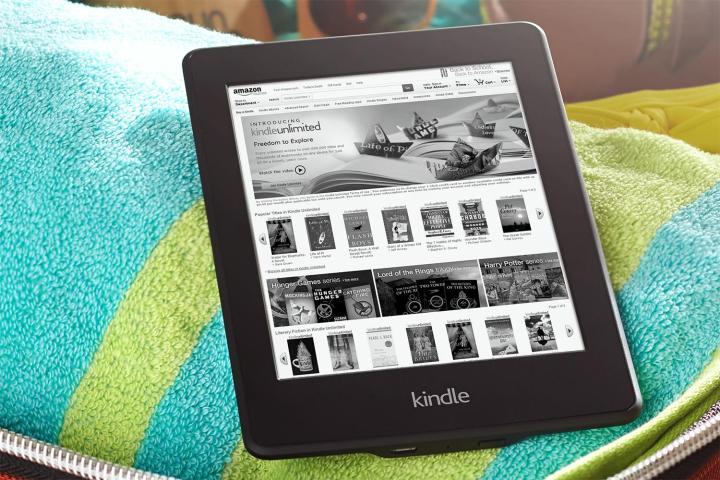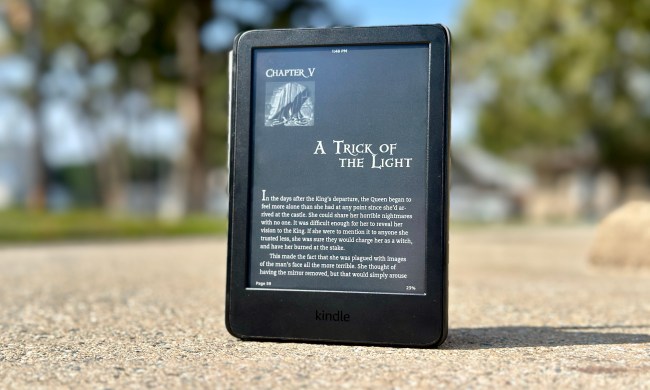
For $10 a month, Amazon now offers unlimited access to a library of 600,000 e-books, and it’s already clear I’ll be portioning out another piece of my paycheck to the online behemoth.
Given the way I tend to plow through books, it seems I might actually save some money on this deal. There are plenty of books on my list that haven’t made their way into the library of included offerings, but it’s still a no-brainer priced at the equivalent of one book per month — the latest in a long line of Amazon offers we can’t really refuse.
We all knew that last week’s launch of Kindle Unlimited was an inevitability.
After all, I’ve spoken with plenty of brick and mortar shop owners who helplessly grumble at the stream of customers who enter their store, examine a product and proceed to order it online at the sort of greatly reduced fee only a company the size of Amazon can provide. And then there’s the tales of overworked and underpaid shipping clerks running across warehouses to fill orders as their digital clock ticks down impossible times. And certainly the company’s on-going dispute with Hachette has left a bitter taste in a lot of mouths.
Book publishing wars aside, let’s be honest, we all knew that last week’s launch of Kindle Unlimited was an inevitability. In fact, given the company’s book-selling origins and clear commitment to the content-borrowing subscription model (embodied in services like Prime Instant Video and Prime Music), it’s actually a surprise that Amazon took so long to connect those dots. The primary bottlenecks, one assumes, were striking the right deal with publishers and settling on a pricing model — $10 a month distinct from Prime is a marked changed from simply rolling it into the Prime subscription, as Amazon has done with other offerings.
So where does that leave writers like me?
We’ve all heard the horror stories of the fractions of cents being doled out by Spotify, with the justification that many musicians make their mint touring anyway. For one thing, that’s hardly a universal and for another, where’s the author’s analog to touring? Unless you’re, say, Hillary Clinton pulling in $200,000 per speaking engagement, no one’s paying big bucks to watch you read. You’re there to sell more books.
The other justification for music-streaming services is the notion that people who really love a record will go out and buy it. Perhaps I’ve just become too immersed in the world of e-books too quickly, but I’m having difficulty imagining a scenario in which I run out and buy a hard copy of a book after reading the electronic version. It certainly hasn’t happened to me yet — I also haven’t found myself going back and re-reading too many e-books to this point.
Of course, borrowing books isn’t exactly a revolutionary concept. Apparently there are entire governmental and academic institutions devoted to this phenomenon, requiring just a simple piece of plastic for you to walk out the front door, books in-hand. For a brief, hopeful moment, there was even the notion that electronic book rentals might be the saving grace of libraries, a concept that fell flat after e-book sellers and retails realized combining the ease of an e-book with the free model of a library wouldn’t do them any favors.
But it isn’t all bad news for the book biz. Services like Kindle Unlimited offer the chance for both Amazon and publishers to continue to make a little extra money off of older titles. We’ll likely continue to see a model similar to the one the movie industry has employed for decades: charge a premium for products right out of the gate, then retire them to a “free” model (TV in the case of movie studios) once the number of people willing to pay directly for a product has sufficiently dwindled. As with digital music, the overhead is almost non-existent, and with book sales down in general, it seems that publishers don’t have a heck of a lot to lose.
People stopped making music the minute Napster arrived on the scene, right?
If I had to venture a guess as to publishing’s future, I’d say we should look to the music industry to see what lies ahead. While there is still value in both, publishing houses, like record labels, will continue to shrink. Some authors will rely more heavily on independent houses, while more enterprising ones will eschew them altogether — and, of course, Amazon will be right there waiting for them with the ability to publish directly.
Does this all mean the “end of books” as some have editorialized? Well, sure — people stopped making music the minute Napster arrived on the scene, right? As long as people are compelled to write and others to read, books will be around. We will, however, have to be more open minded about what qualifies as such. That means digital growing pains, as usual.
But perhaps the prospect of 600,000 books at your fingertips for $10 a month will help cushion the blow.


